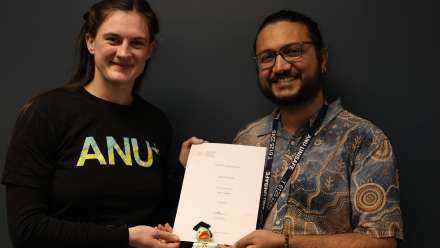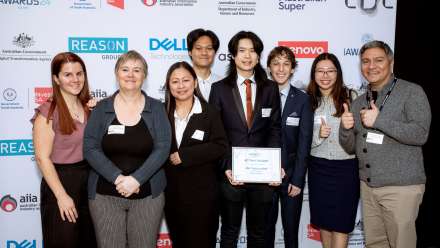$3m grant for biotech collaboration to develop new therapies
The CRC-P grant is an exciting milestone for VivaZome and the broader field of regenerative medicine, said Associate Professor Natoli.
A collaborative research project involving scientists from the Clear Vision research lab at The Australian National University (ANU), and biotech company VivaZome Therapeutics, has been awarded a $3m government grant to develop VivaZome's exosome-based therapeutics that could treat traumatic brain injury and retinal disease.
Clear Vision, led by Associate Professor Riccardo Natoli, is the project's lead retinal disease pre-clinical partner and is exploring the use of exosomes in treating age-related macular degeneration (AMD).
Current treatments for AMD can involve invasive eye injections but the Clear Vision team is hopeful that in the future exosomes could offer a more precise approach, with patients potentially treating themselves at home.
The grant was awarded by the Australian government as part of the Cooperative Research Centres Projects (CRC-P) initiative, which aims to support collaborative research partnerships between industry and universities.
The other project partners on the grant titled "Customised Exosomes - the Future of Regenerative Medicine" are La Trobe University, the University of Queensland, biotech research company Cytiva Life Sciences and pharmaceutical manufacturers SeerPharma.
CEO of VivaZome, Dr David Haylock said the team was excited by the opportunity to conduct a capacity and capability building research program in collaboration with a group of world-leading partners.
"With the help of our partner organisations, we will establish an exosome manufacturing facility, optimise technologies and processes for manufacturing, develop customised exosome products with enhanced function, and generate proof-of-concept data for clinical indications in areas of significant unmet need - ophthalmic and neurological diseases," he said.
Associate Professor Natoli said the grant funding would be split in broadly two directions: manufacturing capabilities and testing.
"At Clear Vision, we'll be testing a range of extracellular vesicles (EVs), largely generated from stem cells, to see which ones provide the best entry, either locally or systemically, to gain access to the back of the eye," he said.
"Exosomes are small vesicles produced by cells with the potential to be used as a delivery mechanism for targeted therapies, as they're incredibly effective at transporting drugs and other molecules to specific cells."
Dr Haylock said the project aims to make a difference to the health of Australians suffering from retinal disease and brain injury.
"This funding will enable us to build on our existing research and take our technology to the next level, with the goal of bringing life-changing therapies to patients around the world," he said.
The CRC-P grant is an exciting milestone for VivaZome and the broader field of regenerative medicine, said Associate Professor Natoli.
Head of La Trobe Institute for Molecular Sciences (LIMS), Dr Lesley Cheng said the grant would also provide a PhD industry scholarship to help build the next generation of interdisciplinary scientists with this industry-relevant project.
"Our team is excited to continue our partnership with VivaZome to provide our EV analytics and characterisation expertise to develop EV therapeutics," she said.
Director of SeerPharma, Paul Kerr said the grant would support VivaZome's objective of achieving a commercial manufacturing process for a new field of therapeutics that has immense treatment potential.
"SeerPharma brings a wide array of industry-focused compliance and quality management services to the CRC-P program. Our main role is developing efficient and phase-appropriate compliance programs for preclinical and clinical development," he said.
"These funds will provide a ready-to-use set of policies, procedures and tools to help grow the VivaZome operation.
"We will be able to provide personal attention so that VivaZome gets highly focused, clear and personalised advice on how to customise and work within this framework."
Work on the project starts in early 2023 with a series of significant scientific, industrial and education milestones to be achieved by the end of 2025.


